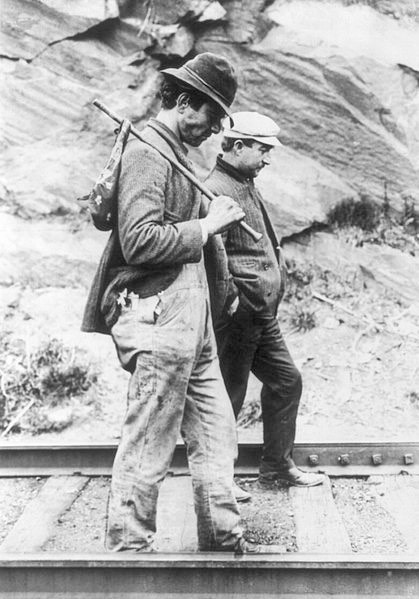
Wanderin’ appears on page 188 of Sandburg’s The American Songbag. He writes, "This peculiarly American song… is from Arthur Sutherland of Rochester, New York, as learned from comrades in the American Relief Expedition to the Near East. It is a lyric of tough days.” (Just what the American Relief Expedition to the Near East was, is not explained, but perhaps it refers to one of the relief expeditions carried out shortly after the end of the First World War.)
The title appears as one of seven that make up the section Hobo Songs. "Hobo" is the American term for a tramp or vagabond. The number of hobos greatly increased in the USA during the Great Depression in the 1930s, but Wanderin' precedes that time.
Sandburg provides a musical arrangement for the song by Hazel Felman, together with two sets of verses. The first (A) is made up of three stanzas from the aforementioned Arthur Sutherland, and the second (B), of just two stanzas, is from Hubert Canfield of Pittsford, New York.
A
- My daddy is a engineer,
My brother drives a hack,
My sister takes in washin’
And the baby balls the jack,
An' it looks like
I'm never gonna cease my wanderin'. - I been a wanderin’
Early and late,
New York City
To the Golden Gate,
An' it looks like
I'm never gonna cease my wanderin'. - Been a-workin' in the army,
Workin' on the farm,
All I got to show for it
Is the muscle in my arm,
An' it looks like
I'm never gonna cease my wanderin'.
B
- There's snakes on the mountain,
And eels in the sea,
'Twas a redheaded woman
Made a wreck out of me,
And it looks like
I'm never gonna cease my wanderin’. - Ashes to ashes
And dust to dust,
If whiskey don’t get you,
Then the women must,
And it looks like
I’m never gonna cease my wanderin’.
And that is all that was written about Wanderin’. However, it seems to have been enough to have caught the interest of the man who was the first major star of Country music, Vernon Dalhart.